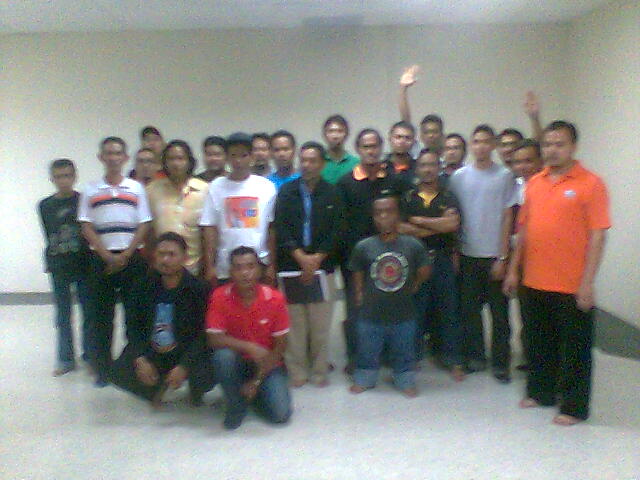Anwar’s Bridging Ability
by Terence NettoPKR leader Anwar Ibrahim reiterated his view that the best way to combat violence and terrorism is to remove authoritarianism and dictatorship.
Speaking on the subject of ‘Islam and Democracy in East Asia’ at the University of in California in Berkeley last week in the second half of a two-week lecture tour of the United States, Anwar said that if the world is to wage war on the level of ideas, then the targets should be the deeper causes of terrorism and extremism and not its manifestation in the violent actions of fringe groups.
He told a distinguished audience that included Nobel laureates that “I believe that given freedom and democracy Muslim societies will know how to deal with the radicals and extremists.”
 Anwar (right) cited Iran in 1953, Iraq in the immediate post Second World War period, Indonesia in 1955, and Pakistan in 1947 as examples of Muslim societies that demonstrated an interest and engaged in the rituals of democratic process but because of foreign intervention or military adventurism the experiments did not bear fruit.
Anwar (right) cited Iran in 1953, Iraq in the immediate post Second World War period, Indonesia in 1955, and Pakistan in 1947 as examples of Muslim societies that demonstrated an interest and engaged in the rituals of democratic process but because of foreign intervention or military adventurism the experiments did not bear fruit.He held that he did not think “I am going out on a limb in saying that the fundamental principles of democracy are alive and well in the Muslim tradition.”
He elaborated: “You might be surprised to hear that freedom is in fact one of the underlying themes of the Islamic law. Islam has always been defined by its commitment to justice, ‘adl, which entails consultation in governance and abhorrence of tyranny and despotism.
“These ideals are encapsulated in the higher objectives of the sharia, a concept articulated by the 8th century jurist al-Shatibi. Whereas Islamic law is today almost exclusively understood in light of specific rulings and regulations, al-Shatibi explained that the real substance of the law are its higher objectives, known as the maqasid, that seek to implement in society the preservation of religion, life, intellect, family, and wealth. “
Noted for drawing parallels between Islamic thought and western streams of speculation, Anwar held that al-Shatibi’s discourse bore “striking resemblance to the Lockean ideals that would be propounded centuries later and gradually filter into the formulation of the American constitution.”
Phenomenon of Religious Belief
Anwar’s penchant for synthesizing thought from Islamic and western streams recently drew attention from an unlikely quarter. Sholto Byrnes, assistant editor of the British left wing publication, New Statesman, said in a column in the September 3rd edition, that Anwar had once commented that “Asian man was ‘Homo religiosus’ “.
Evidently, the term was derived from Adam Smith, the Scottish moral philosopher and economic theorist, who founded classical economics on the premise of the rational “economic” man – “Homo economicus”. Anwar is fond of quoting from Adam Smith’s books, especially The Theory of Moral Sentiments.
 Byrnes, whose column citing Anwar was an appeal for keener appreciation for the reality of religious belief – the object of widespread derision, if not contempt, in British intellectual circles – wrote that the Malaysian opposition leader was “admired by thinkers and leaders from Amartya Sen to Al Gore (left).”
Byrnes, whose column citing Anwar was an appeal for keener appreciation for the reality of religious belief – the object of widespread derision, if not contempt, in British intellectual circles – wrote that the Malaysian opposition leader was “admired by thinkers and leaders from Amartya Sen to Al Gore (left).”Byrnes quoted Anwar on “Homo religiosus” to argue the point that the phenomenon of religious belief must not be taken as “misguided delusions” when the “convictions of billions do so much to shape our geopolitics.”
The New Statesman is a left wing journal, and like publications of its kind, an unlikely forum for the appreciation of the reality of religious belief.
That Anwar Ibrahim, supposed darling of neoconservatives who needless to say are anathema to left wingers, can draw attention from both sides of the ideological divide  suggests that his penchant for combining disparate streams of speculation is beginning to resonate in far flung intellectuals hubs.
suggests that his penchant for combining disparate streams of speculation is beginning to resonate in far flung intellectuals hubs.
 suggests that his penchant for combining disparate streams of speculation is beginning to resonate in far flung intellectuals hubs.
suggests that his penchant for combining disparate streams of speculation is beginning to resonate in far flung intellectuals hubs.













Tiada ulasan:
Catat Ulasan